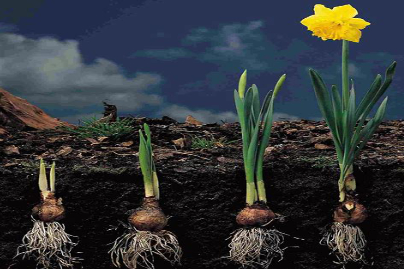For a number of reasons I have, in the last few days, had to write some papers concerning Growth and Development. It is interesting to reflect on Growth in general, especially as we start to move into spring. Daffodils and snowdrops are emerging and there are again signs of new life and Growth appearing in the natural world.
We can also, at this time of year, think about how we, as Buddhists, are going to grow. How we are going to progress on the spiritual path? How we are going to achieve Enlightenment?
So how do we tell if we are growing? With daffodils it is easy, they burst out of the cold wet ground with glaucous, green leaves that soon will reveal a beautiful yellow flower, similar to a lotus rising out of the mud for northern climates. We can imagine the leaves as a path and the flower is the goal of that path.
We can look in the Pali canon to find descriptions of the way-points and goal of the Buddhist path. We can listen to many Buddhist teachers who, down the ages, have given us descriptions of the experience of stages on the path and the experience of Enlightenment or Nirvana, the term used in the Pali canon.
We can use Sangharakshita’s five stages of Spiritual practice as ways to know our position on that path. To remind you here they are in ascending order, Integration, Positive emotion, Spiritual death, Spiritual rebirth and finally the stage of No More Effort or ‘Spontaneous Compassionate Activity’ which equates to Buddhahood. Up to this final point if we wish to Grow we have to make an effort. We have to do something. Unfortunately, for us, unlike the daffodil, we will not naturally flower and bloom into Nirvana. So how, and what do we do to enable us to develop, to progress on our Buddhist path to the blooming of the Dharma?
It is simple; Growth for us as a Buddhist is drinking in the Dharma, growing our understanding of the Dharma and learning to put it into practise in our daily life.
Sangharakshita gave a lecture at the Buddhist Society in London in 1975. This ends with a very clear and easily comprehended way of understanding Enlightenment. He carefully explains that Nirvana cannot be an experience as we usually have in our life, but is unconditioned therefore a ‘non-experience’. He talks of 3 aspects of this non-experience; Growth, Work and Duty.
I have explored a little of Growth, I leave it to you to think about Work and Duty.
With Metta, may you progress
Bodhivamsa

